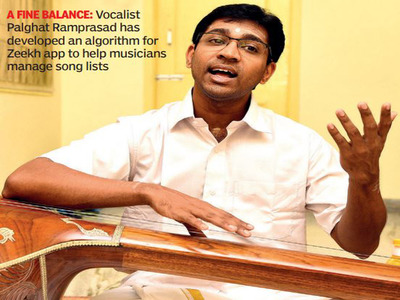
Chennai :
It is not often that a scholar in applied econometrics gets his alaaps right. But Palghat Ramprasad, born into the family of legendary Carnatic musician Palghat Mani Iyer, found his love for numbers and music was not mutually exclusive.
Grandson of the incomparable mridangam legend, the persona of Mani Iyer is writ large over the thoughts, words and deeds of all the musical reflections of Ramprasad. “I have grown up listening to more stories about my grandfather than tales from epics,” says the independent economist who consults for Tamil Nadu government projects as well as organisations like the UN and its sister concerns.
In 2004, when he was making a name in music circles, he had to take a hard decision to become a full-time economist. Having bagged a record of gold medals in his postgraduate study in economics at University of Madras, academics seemed a stable investment. He went onto get a PhD in applied econometrics on gender, poverty and other social issues from the University of Georgia, Atlanta, but his loyalty to music remained and he eventually devoted enough time for ‘sadhakam’.
His initiation into music as a vocalist was influenced by his grandfather. “Though my father and guru Rajamani was a violinist I did not follow in his footsteps because my grandfather felt that being an accompanist relegated one to a corner. He could not achieve what the main artist could and he had that sense of longing always in him,” says the 36-year-old, who was a visiting post-doctoral fellow at Harvard University.
Ramprasad sticks to tradition, not believing in detracting from songs made popular by masters such as Ariyakudi, Semmangudi, Madurai Mani Iyer and G N Balasubramaniam. For him, repetition is a way of establishing a rapport with the audience a la Semmangudi. “It helps me recognise the intrinsic value in the krithis. In fact, I listen to recorded performances of the 1970s more than those belonging to the later years,” he says. He still includes quite a few ‘neravals’ (extempore rendering of varieties for the same line in a song), a suggestion of Mani Iyer, with an amazing clarity in the lyrics.
Having made his debut when he was seven-and-a-half years old, he has been accompanied by mridangam maestros like Umayalpuram Sivaraman and Palghat Raghu.
In between preparing for concerts this season, he also found time to merge his profession and passion by developing an algorithm that could help musicians save hours of labour. Named ‘Manipravaha’, after his grandfather, it is part of the Zeekh app and helps create and document song lists for concerts. ‘Manipravaha’ is able to identify a variety in songs with respect to ragam, talam and composers and the artist is thus able to avoid repetitions by keeping track of songs rendered by him in previous concerts. Listeners can also make requests for songs by directly communicating with the artist. “A theory called the Delanay triangulation, an optimisation technique used in computational geometry, has been deployed in developing this algorithm,” says Ramprasad. The app has been downloaded around 2,000 times this season by artists and rasikas.
(The author is a music enthusiast)
source: http://www.timesofindia.indiatimes.com / The Times of India / News> City News> Chennai News / by Aarvalani / TNN / December 26th, 2017